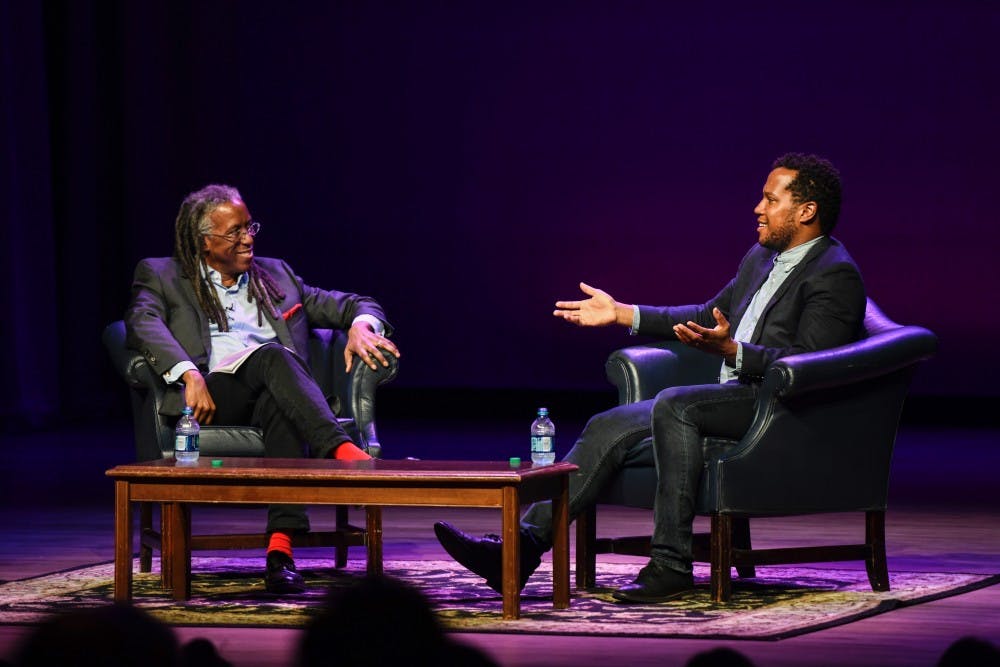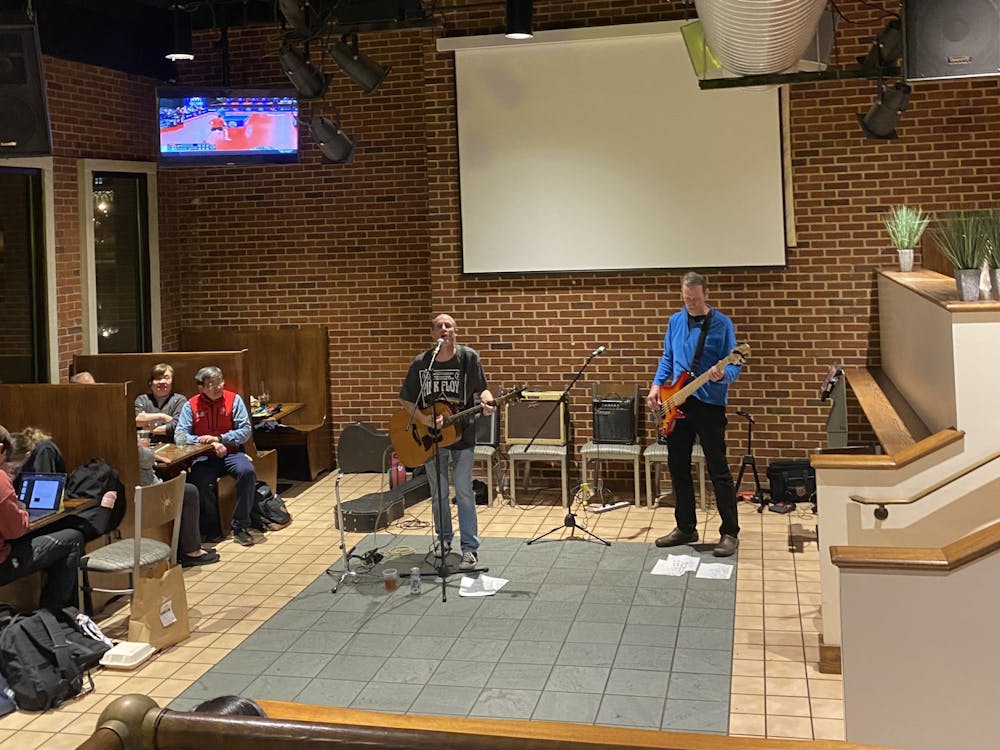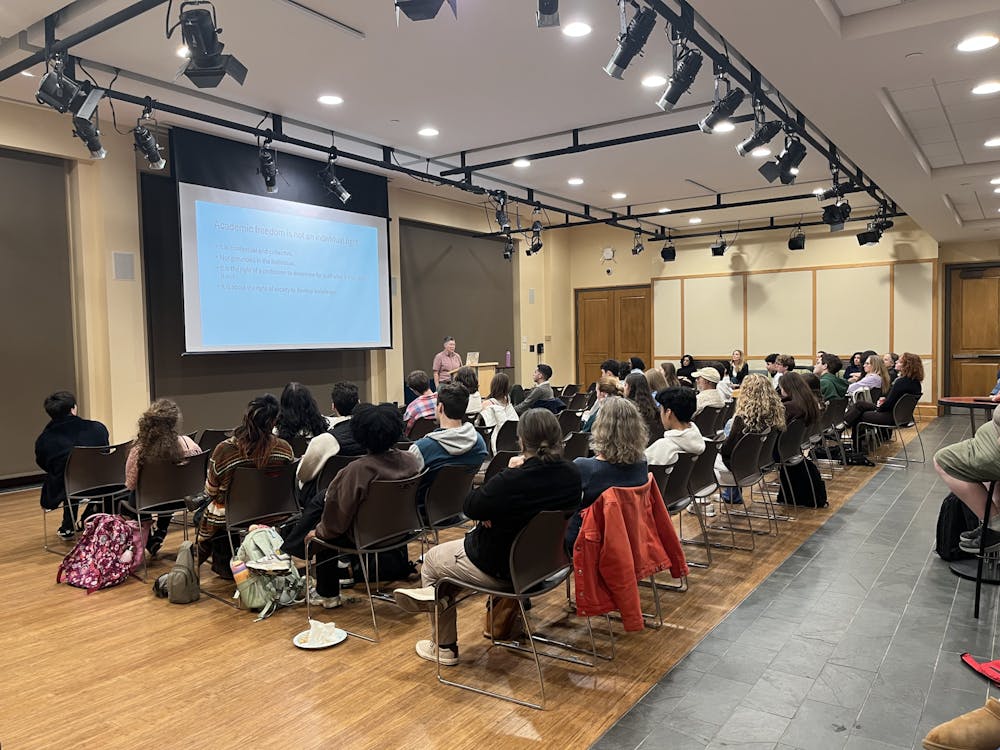I’m just doing my best to break down the nonsense, playwright Branden Jacobs-Jenkins told his audience Friday night in Camp Concert Hall of the Modlin Center for the Arts.
Jacobs-Jenkins’ talk was sponsored by the Cultural Affairs Committee, the department of theatre and dance, the American studies program and the English department.
Jacobs-Jenkins discussed a range of topics, from the art of representation in theater to what he thinks about being identified as a “black playwright.”
“The phrase ‘black playwright’ felt and feels to me like a marketing term, right, because I don’t know anyone who’s referred to as a ‘white playwright,’ and that was sort of the game, you know,” Jacobs-Jenkins said. “And when I ask people to explain to me what a black playwright is, no one really has an answer for it.”
Jacobs-Jenkins has written seven plays, including his debut "Neighbors" in 2010. Since then, his plays "Gloria" and "Everybody" were nominated for the Pulitzer Prize, and his plays "Appropriate" and "An Octoroon" won the Obie Award for Best New American Play.
UR’s theater department put on a production of Jacobs-Jenkins’ "Appropriate" the first weekend in October, which marked the fourth time one of his plays has been offered in the Richmond area in the last year and a half.
Dorothy Holland, a professor of theater and women, gender and sexuality studies, directed the theater and dance department’s production of "Appropriate" and said that after she had seen a production of Jacobs-Jenkins’ "An Octoroon" in Washington, D.C., she had known the department had to produce one of his plays.
“'Appropriate' doesn’t seem to be quite as flamboyantly theatrical as 'An Octoroon' or as 'Neighbors,' where he uses kitchen sink realism mashed up with minstrelsy so people would see black bodies wearing blackface moving next to the neighbors,” Holland said. “So 'Appropriate' isn’t that flamboyantly theatrical, but it is so engaging in the way he’s calling on and recognizing this homage.”
Bertram Ashe, an English professor, moderated the discussion with Jacobs-Jenkins and, according to the media release that announced Jacobs-Jenkins’ arrival, played an integral role in bringing the playwright to campus.
“I just think that it’s unusual — I’m not going to say it’s unprecedented — but it’s unusual to have one playwright have four different productions devoted to his plays over the course of a year and a half,” Ashe said. “And I thought it would be fun at the end of that year and a half to have him come and sort of share what he’s thinking about and what is on his mind since there’s such radically different plays and yet he’s one guy, it’s all coming from his mind and his skill.”
In response to a question from Ashe to explain why the exploration of race within his plays involves the pushing of social norms, Jacobs-Jenkins said he didn’t shy away from discomfort because he found it very productive to move through experiences.
Jacobs-Jenkins then specifically discussed his play "Neighbors," in which black actors are directed to wear blackface, and said he wanted his play to ask about the grotesqueness of putting on someone else’s skin. He said he was also curious about when the audience’s laughter would return after a shocking event.
Enjoy what you're reading?
Signup for our newsletter
He recalled a moment in a Nina Simone song called “Mississippi Goddam” when everyone in the audience is clapping along with the singer, but then she takes a turn in the song and everyone immediately stops laughing.
“I remember feeling like that’s what I want, I want my play to do that," Jacobs-Jenkins said. "I want the audience to hear itself stop laughing, you know, and that’s sort of the experience that "Neighbors" really works for me. You feel the audience start to listen to itself differently and that’s what I wanted to make.”
After Ashe finished asking questions, Jacobs-Jenkins took questions from the crowd.
Holland, who attended the talk, asked the playwright how he went about challenging people’s assumptions and when that pushing of limits took place in his creative process.
Jacobs-Jenkins responded that it started with wanting to create engaging theater.
“I just think that the more you encounter a dull thing, the more your senses are dulled, your imagination is dulled and I feel like our task has to be to remind people that no, no, no, theater can be great, you just have to break it open and make it new for each generation that comes through,” Jacobs-Jenkins said.
Holland said the talk had been even better than she could have imagined.
“It’s stunning, the detail, the specificity with which he talks about his work, it’s just profound," Holland said. "It’s inspiring, it’s enlightening. It was actually one of the best conversations I think I’ve ever been a part of at an artist talk.”
Contact lifestyle editor Sydney Collins at sydney.collins@richmond.edu.
Support independent student media
You can make a tax-deductible donation by clicking the button below, which takes you to our secure PayPal account. The page is set up to receive contributions in whatever amount you designate. We look forward to using the money we raise to further our mission of providing honest and accurate information to students, faculty, staff, alumni and others in the general public.
Donate Now



